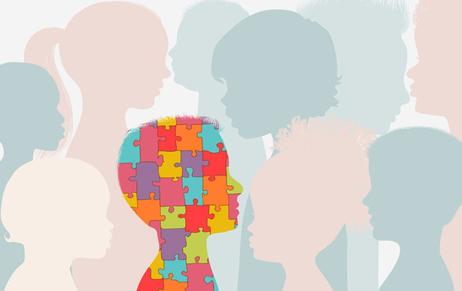I don't remember hearing about children with autism growing up in Montreal. It only came onto my radar when I was older, and I had some co-workers with autistic children. From what I was told, these children seemed to have mild cases of autism. This was later confirmed when I saw posts on Facebook recounting academic and other successes. Many years later, while working at the local classical music radio station, I interacted regularly with two adults who had much more severe cases of autism. Both individuals seemed to know more about classical music than I did, and I am a professional musician! But neither of these two adults appeared to be able to function in a so-called usual manner.
That got me thinking about how I would parent a child who was autistic. So, let's look at the facts, and then I'll offer you some resources on the subject. But first, here's the definition of autism.
Autism is a developmental disorder with symptoms that appear within the first three years of life. Its formal diagnostic name is autism spectrum disorder. The word "spectrum" indicates that autism appears in different forms with varying levels of severity. That means each autistic individual experiences unique strengths, symptoms, and challenges. Source: Autism Research Institute
This video from The Mayo Clinic explains what autism is.
The diagnosis
You can't do a blood or other medical test to see if your child has autism. Here's what the Centers for Disease Control and Prevention has to say:
Diagnosing autism spectrum disorder (ASD) can be difficult because there is no medical test, like a blood test, to diagnose the disorder. Instead, doctors look at the child's developmental history and behavior to make a diagnosis. ASD can sometimes be detected at 18 months of age or younger.
This video explains how autism is diagnosed.
Resources
- Autism Speaks: This is a leading advocacy organization for autism that provides resources, support, and information to families of autistic children. Their website includes toolkits, guides, and a directory of local resources.
- The Autism Society: This organization provides education, advocacy, and support to families affected by autism. They offer a variety of resources, including a national helpline, local chapters, and online support groups.
- National Institute of Mental Health: NIMH provides research-based information about autism and related disorders, including symptoms, diagnosis, and treatment.
- Centers for Disease Control and Prevention: The CDC provides information on autism, including prevalence rates, screening tools, and resources for families and professionals.
- Autism Research Institute: ARI provides research-based information about autism and related disorders, including treatments and interventions.
- Autism Parenting Magazine: A digital magazine that offers tips, advice, and stories from parents and professionals in the autism community.
- The Thinking Person's Guide to Autism: A website and book that provides essays and articles written by autistic people, parents, and professionals.
- Autistic Self-Advocacy Network: A self-advocacy organization run by and for autistic people that provides resources, advocacy, and support to autistic individuals and their families.
- The National Autistic Society: This UK-based organization provides support and resources to families affected by autism, including information on diagnosis, education, and support services.
- Parent to Parent USA: This organization provides peer support, resources, and information to families of children with special needs, including autism. They connect parents with trained parent mentors who can offer guidance and support. Source: ChatGPT
Teaching children with autism
If you are worried about how your autistic child will function in school, read what some teachers say about teaching children with autism.
- 6 Tips for Teaching Students With Autism
- 30 Activities, Teaching Strategies, and Resources for Teaching Children with Autism
Unfortunately, because each child's autism presents uniquely, you will be in charge of your child's education. You alone know what your child can and cannot do. You alone know the triggers that will create an overload. Read all you can about autism—separate informed opinion from uninformed opinion. When somebody suggests something that works for their child, explore it, understand it, and carefully experiment with it to see if that works for your child's situation. Educating any child involved much more than teaching them how to read and write. Developing social interaction skills and building self-awareness will help your child develop confidence.
This video offers some suggestions on how to teach children with autism.
Therapies for children with autism
You and your family's autism specialist will know which therapies will be most effective for your child. ChatGPT offered the following suggestions:
Several types of therapy and interventions are available to help children with autism. Here are some of the most commonly used treatments:
Applied Behavior Analysis (ABA)
This therapy is based on the principles of behaviorism and uses positive reinforcement to teach new skills and improve behavior. ABA therapy can be tailored to the child's individual needs and can be used to address a variety of skills, such as communication, social skills, and self-care.
Speech therapy
Many children with autism have difficulty with communication, including speaking, understanding language, and using nonverbal communication. Speech therapy can help these children develop better communication skills, including expressing themselves, understanding others, and operating nonverbal communication, such as gestures and facial expressions.
Occupational therapy
Occupational therapy focuses on developing the skills needed for daily living, such as self-care, fine motor skills, and sensory processing. Many children with autism have difficulty with these skills and can benefit from occupational therapy to improve their ability to perform daily tasks.
Social skills therapy
Children with autism often struggle with social interaction and may struggle to make and maintain friendships. Social skills therapy can help these children learn social cues, develop friendships, and improve their ability to interact with others.
Cognitive behavioral therapy (CBT)
CBT is a type of therapy that focuses on helping children understand and manage their thoughts, feelings, and behaviors. CBT can be used to address anxiety, depression, and other mental health issues that may be associated with autism.
Sensory integration therapy
Many children with autism have sensory processing issues, which can cause them to overreact or underreact to sensory input. Sensory integration therapy aims to help children develop better sensory processing skills and more effectively cope with sensory information.
These therapies are often combined to provide a comprehensive treatment approach for children with autism. The specific therapy or combination of therapies used will depend on the child's and their family's individual needs. Working with a qualified therapist or team of therapists is essential to determine the best course of treatment for your child.
Questions? Contact us on Facebook @privateschoolreview





















